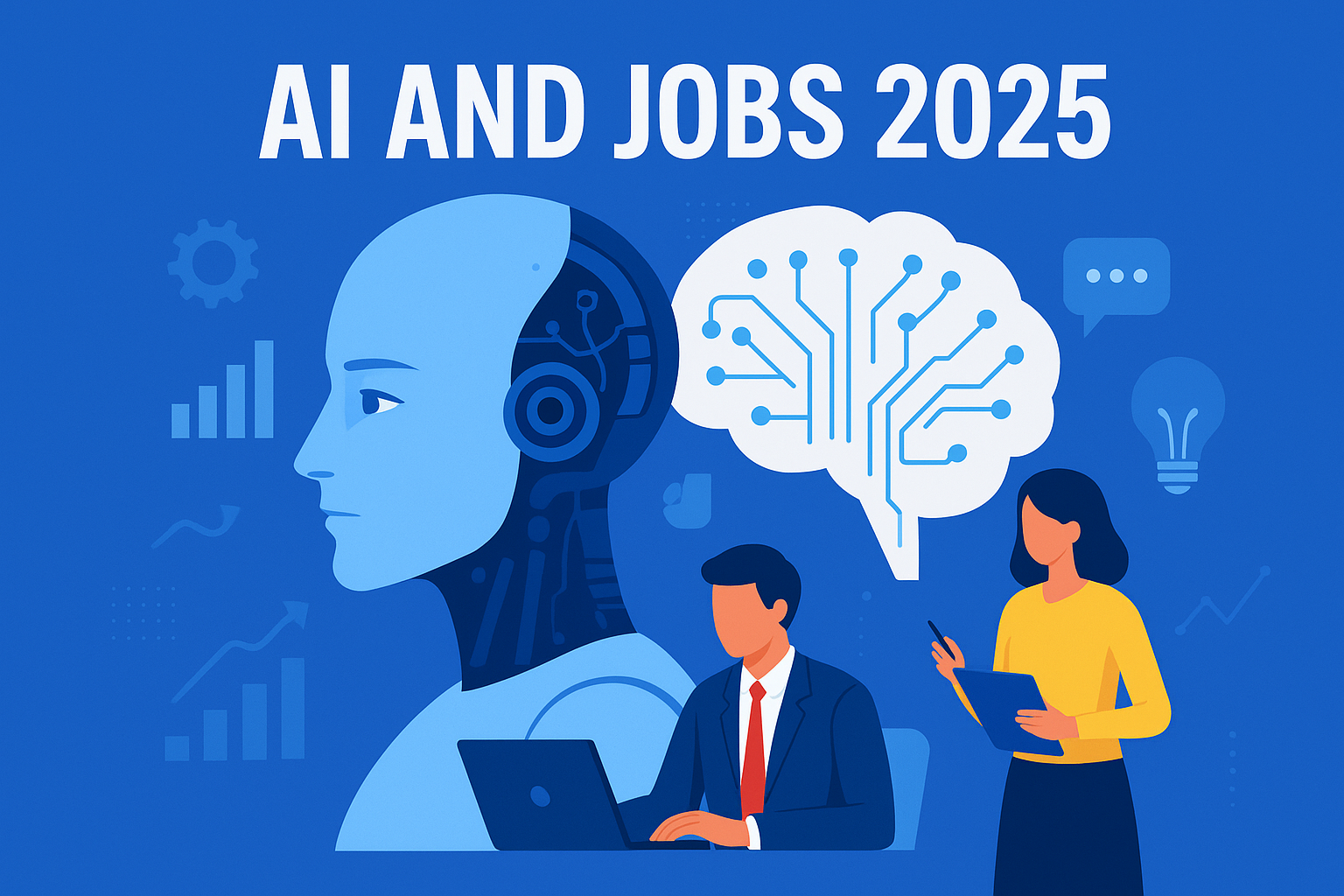Introduction: The Rise of AI and Jobs 2025
The conversation around AI and jobs 2025 has become one of the most pressing discussions in today’s global economy. Artificial Intelligence (AI) is no longer a futuristic concept—it’s a present reality shaping the future of employment, redefining how humans and machines collaborate, and influencing what work will look like in the next decade.
By 2025, automation, robotics, and machine learning are expected to impact almost every industry. From manufacturing to marketing, no sector is untouched by this technological transformation. The question is not whether jobs will change, but how they will evolve.
1. Automation and the Transformation of Work
Automation is at the heart of the AI and jobs 2025 revolution. Tasks that once required human intervention are now being performed by algorithms and intelligent systems. For instance, in sectors like logistics and customer service, AI chatbots and autonomous delivery systems are already becoming mainstream.
According to the World Economic Forum’s Future of Jobs Report, AI-driven automation will create 97 million new roles even as it displaces about 85 million existing ones. This shift highlights that automation isn’t simply a job destroyer—it’s a job transformer.
2. Emerging Careers in the AI Economy
One of the most exciting aspects of AI and jobs 2025 is the rise of entirely new career paths. As businesses adopt intelligent systems, demand is soaring for professionals who can manage, interpret, and improve these technologies.
Key Emerging Roles:
- AI Ethicists – Ensuring fairness and transparency in automated decision-making.
- Data Scientists and Machine Learning Engineers – The architects of AI models.
- AI Trainers and Prompt Engineers – Teaching AI systems to respond effectively.
- Automation Supervisors – Overseeing human-AI collaboration in industrial settings.
According to LinkedIn’s Future of Work Report, AI-related roles are growing at 35% annually worldwide—one of the fastest-growing career categories in the digital economy.
3. The Future Workplace: Collaboration Between Humans and AI
Rather than replacing humans, AI is expected to augment human capabilities. In AI and jobs 2025, the workplace of the future will prioritize human creativity, emotional intelligence, and problem-solving—areas where AI still falls short.
For example, marketing professionals will rely on AI to analyze audience behavior, but crafting compelling narratives will remain a distinctly human skill. Similarly, AI-powered diagnostic tools in healthcare will support doctors, not replace them.
Key Trend:
The future of work will focus on “Human + AI Collaboration”, where technology amplifies productivity and innovation rather than competing with the workforce.
4. Upskilling and Reskilling: The Survival Strategy
As AI and jobs 2025 reshape industries, the need for continuous learning becomes critical. Workers must embrace upskilling and reskilling to stay relevant. Governments, educational institutions, and corporations are now investing heavily in digital literacy and AI education programs.
Examples of Global Initiatives:
- Google’s “AI for Everyone” – A free learning platform designed to democratize AI knowledge.
- Coursera and edX AI Certifications – Providing accessible upskilling opportunities globally.
- Government-led Digital Literacy Projects – Nations like Singapore and Finland are pioneering national AI education strategies.
These programs ensure that workers are not left behind as automation advances.
5. Ethical and Societal Implications of AI in Employment
The integration of AI and jobs 2025 also brings serious ethical considerations. Job displacement, data privacy, algorithmic bias, and inequality are major challenges that policymakers must address.
AI can unintentionally reinforce existing biases in hiring or salary structures if not carefully monitored. Therefore, ethical AI development and regulatory oversight will play a crucial role in shaping a fair and inclusive AI-driven job market.
For deeper insights, explore the World Economic Forum’s AI Governance Report
6. Industry-Specific Impact of AI in 2025
AI’s impact will vary across industries:
- Healthcare: AI diagnostics, robotic surgery, and predictive analytics improving patient outcomes.
- Finance: Fraud detection, risk analysis, and automated trading.
- Education: Personalized learning systems adapting to student needs.
- Retail: Smart inventory management and customer personalization.
- Manufacturing: Smart factories with predictive maintenance reducing downtime.
Each of these transformations underscores how AI and jobs 2025 will redefine professional roles while opening new economic frontiers.
7. Preparing for an AI-Driven Future
To thrive in AI and jobs 2025, both individuals and organizations must prioritize adaptability, lifelong learning, and digital transformation.
Tips for Future-Ready Professionals:
- Develop soft skills (communication, creativity, adaptability).
- Learn AI literacy and understand data-driven decision-making.
- Embrace hybrid work models that combine technology with human collaboration.
- Follow reputable AI news sources like MIT Technology Review to stay updated.
Learn more about emerging tech careers in our related post — “Top AI Tools to Learn in 2025”
Related to Job Market & Career Top 10 Future-Proof Jobs in the Age of Automation
Conclusion: The Future Belongs to the Adaptive
The age of AI and jobs 2025 represents not an end to human employment, but a reinvention of it. As automation continues to reshape industries, the most valuable skill will be the ability to adapt, learn, and evolve alongside technology.
The future of work is not man vs. machine—it’s man with machine. By embracing the AI revolution responsibly, society can unlock a new era of innovation, productivity, and opportunity.
Want to see where innovation is heading next? Explore Top Tech Trends to Watch in 2025.
